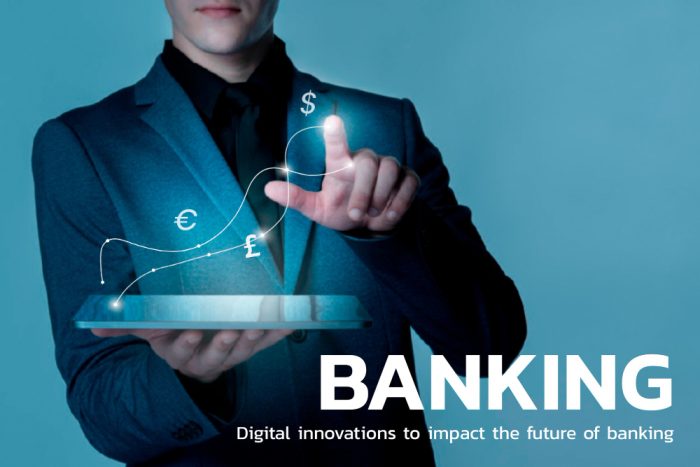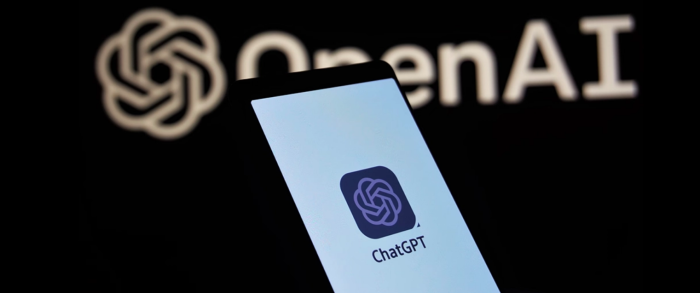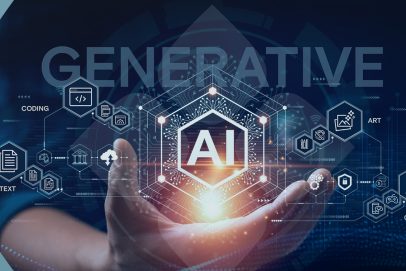Outstanding applications of AI in Banking
With the emergence of new technologies such as cloud computing, data science, and blockchain, artificial intelligence (AI) has become one of the most widely discussed topics today. From virtual assistants like Siri and Alexa, to Chatbots created by OpenAI, Google, Microsoft, artificial intelligence is increasingly having a significant impact on people’s life. This is also the case for business operations, which includes the banking sector.
Chatbots are arguably the first and most noticeable application of AI technology in banking operations. It facilitates more professional customer care and service delivery.
To put it simply, chatbots are computer programs that use artificial intelligence (AI) to communicate with humans. Chatbots are currently being used in a wide range of fields and industries.
In particular, chatbots can take the role of personnel in the banking industry to provide advice and respond to inquiries from customers such as: Answer customers about the card opening process, card opening locations, transaction fees, and promotion policies, etc. Additionally, chatbots can occasionally interact with customers by calling or messaging them to offer advice and take care of them, increasing customer satisfaction with the Bank’s services.
FPT has many years of experience developing and building voicebot/chatbot systems for customers in the banking sector. FPT AI Engage, in particular, is a smart voice bot solution for switchboards that uses cutting-edge technologies like voice recognition, voice synthesis, and natural language processing. This allows for the automatic outgoing and incoming calls in Vietnamese, as well as the combination of calls based on available scripts. The solution enables banks to respond quickly to customers inquiries, promptly resolve their issues, facilitate smooth conversations, and create a seamless interaction, all of which contribute to higher customer satisfaction.
In addition, super chatbots equipped with GenerativeAI (generative artificial intelligence) applications such as ChatGPT, Google Bard or Microsoft Copilot can search, synthesize information, and respond to complex questions using sources from the entirety of the Internet’s knowledge base. Additionally, they can generate content on the bank’s request, including emails, posts on social media, websites, and advertisements, all of which are intended to facilitate communication for banks or businesses.
Chatbots have the benefit of being able to provide professional, round-the-clock support for sales and customer service whenever customers need it.
Chatbots do, however, have certain limitations, including: Unable to fully understand the context and feelings of customers; unable to resolve legal, security or ethical issues; and unable to completely replace direct and personal human interaction.
Therefore, chatbots are currently being applied to help bank consultants with a few basic and repetitive tasks, although they cannot take their place entirely. For service quality and customer satisfaction, chatbots must be used in conjunction with human intervention as needed.
Chatbots come in a wide variety of types. While some chatbots are limited to responding based on pre-written scripts, other domain-specific chatbots are capable of resolving any scenario or issue that customers might bring up. Chatbots’ interactivity will differ based on the technology and database they use. There are numerous chatbots in the world that can communicate like humans; the most well-known one that you may have heard a lot about lately is ChatGPT, which has a vast amount of knowledge and ability to engage in conversation with people in a natural way. In addition, there are many other chatbots that can handle the majority of problems in specific industries, such as:
- Kuki: Chatbots are built on user-generated conversations. Kuki is able to reason with any particular object thanks to a huge database containing more than 1 billion conversations collected over time (https://kuki.ai/.)
- Replika: Chatbots are trained to become the virtual companions of users. Replika generates responses that are natural and customized to the user’s personality and preferences using OpenAI’s GPT-3 language model. Replika can chat about anything, from daily life, interests, to dreams,feelings and moods.
- Wysa: Chatbots are designed to help users resolve mental health concerns including anxiety and depression. Wysa uses psychology and mindfulness techniques to assist users in solving problems and improving their quality of life (https://www.getresponse.com/vn/features/live-chat.)
However, not every chatbot is able to resolve every issue. Certain chatbots operate solely based on pre-programmed scripts or keywords. If users ask questions that are out of scope or unclear, chatbots may not be able to answer or answer incorrectly. Therefore, for service quality and customer satisfaction, chatbots must be used in conjunction with human intervention as needed.
Automation, which streamlines the process, is an outstanding application of AI. AI has the potential to solve human problems in repetitive or complicated tasks.
AI has a huge potential to drive innovation in business models and enhance customer experience in the banking sector. Here are some applications of AI in banking:
- Face or voice recognition: AI can verify the identity of customers by recognizing their voices or faces, which makes consultations and transactions safer and more convenient.
- Analyze large and complex data, predict customer behavior and theneeds and risks of customers helping to provide more suitable and optimal products and services.
- Text summary: AI can summarize the key information in banking-related documents, including contracts, reports, regulations, and other related materials, which can help with efficiency and time savings.
- Support bank process management: AI can automate a variety of banking operational processes, including risk management, customer service, complaint handling, database management, and more. This can save costs while boosting efficiency and accuracy
- CRM, Marketing & Customer Support: Through the use of tools like chatbots, virtual assistants, smart emails, and other technologies, AI may enhance customer interaction and engagement by assisting in the timely and personalized delivery of information, advice, and solutions.
FPT IS also offers a wide range of AI-powered solutions for our customers, including: FPT Chatbot assists in responding to customer questions, and FPT.IDCheck facilitates eKYC, user information authentication, and business process automation for the bank. Additionally, we employ AI to comprehensively analyze and resolve complicated problems for our customers, including: Creating customer personas, segmenting the market, reviving dormant customers, identifying consumers who are likely to discontinue using products and services, facilitating cross and up-selling, as well as other strategies that all contribute to increasing the bank’s clientele and value.
Specifically, users can authenticate chip-embedded ID cards and recognize faces with 100% accuracy thanks to the FPT.IDCheck and FPT.IDReader chip-embedded ID card reader and data extractor. These solutions are based on anti-fake authentication AI technology that complies with international standards (ISO 30107-3). This solution has been developed by FPT IS in association with the Ministry of Public Security’s Research and Application Center for Residents Data (RAR).
The solution is based on the Ministry of Public Security’s chip-embedded ID card authentication application platform, which offers complete anti-authentication capabilities. It completely eliminates the possibility of authentication fraud in transactions, reduces the expense of human resources and transaction processing time, boosts automation capabilities, and makes businesses and organizations more competitive across a wide range of industries.
The solution also contributes to removing significant bottlenecks in the implementation of the government’s Project 06 to develop the application of population data, identification, and electronic authentication for national digital transformation in the period of 2022-2025, with a vision to 2030. Currently, there are 11 financial organizations and banks applying customer authentication via FPT.IDCheck for opening accounts or remote loan services, both of which significantly promote digital banking.
AI will make data collection and analysis easier than it has ever been. Businesses can utilize AI to quickly collect and analyze user data, which helps personalize user experience, boost sales, and retain customers.
Although AI can speed up and simplify the data collection and analysis process, it also presents privacy concerns for users. Therefore, there are some points to note as follows:
Artificial intelligence (AI) has a wide range of applications, from improving user efficiency and convenience to supporting illegal activities like fraud, cyberattacks, and privacy invasion. When personal information is exposed, there can be risks of using AI to:
- Analyze and make use of personal data: Malicious actors can utilize AI to analyze and misuse personal data to determine a user’s interests, behavior, financial situation, location, and interpersonal connections. From there, they may deliver phishing calls, emails, and advertisements in an sophisticated and customized way.
- Steal user identities and accounts: AI can assist malicious actors in stealing users’ identities and accounts through the use of methods like text generation, voice cloning, deepfake, fingerprint spoofing, and more. From there, they can get access to users’ emails, bank accounts, payments, social networks, and other accounts, and they can use this to conduct unauthorized transactions or compromise users’ identities for malicious purposes.
- Monitor and control users: Through the use of technologies like face recognition, license plate identification, location tracking, and others, AI can assist bad actors in tracking and controlling users. They can then jeopardize the user’s personal or family’s security and safety by learning about their activities, schedules, position, and other details.
What to do if personal information is leaked? Users can reduce risks when personal information is disclosed by taking the following actions:
- Change account passwords and enable two-factor authentication: This is a simple but effective measure to prevent unauthorized access to user accounts. Users should use different and strong passwords for different accounts, and change passwords regularly. Additionally, users should use two-factor authentication (2FA) as an extra security layer when logging into key accounts.
- Back up and encrypt important files: This is a protective measure against lost or maliciously encrypted information, including documents, videos, and images. Users should back up important files on external devices or cloud storage services, and use encryption software to protect them from unauthorized access.
- Be cautious of unusal links, emails, messages, and calls: This is a measure to assist users in avoiding online or phone scams. Users should carefully check the source, content and purpose of unusual links, emails, messages, and calls before clicking, responding to, or providing personal information. Users should avoid links, emails, messages, and calls that lead to promotional content that appears too good to be true and demands payment in ransom or the verification of personal information. Monitor and report unusual transactions and activities: This is a precautionary measure to assist users in identifying and quickly preventing unexpected transactions and activities involving personal data. Users should regularly monitor their financial transactions, payments, social networks, etc. and report to competent authorities when detecting discrepancies or suspicions.
Vietnam’s current legislation on data protection, personal information and privacy: Decree 13/2023/ND-CP on protection of personal data. This is the first legal document in Vietnam that provides specific and comprehensive guidelines for the protection of personal data. This decree was issued on April 17, 2023 and took effect from July 1, 2023. This Decree applies to any domestic or foreign entities as well as individuals that are involved in the processing of personal data in Vietnam.
- Main provisions of Decree 13/2023/ND-CP: This Decree regulates concepts related to personal data, principles for processing personal data, in which personal data is processed without the consent of the individual, rights and obligations, obligations of individuals and personal data processors, personal data protection measures, situations in which personal data is transferred abroad, situations in which personal data is transferred to competent authorities, situations in which personal data is processed in violation of the law, measures for handling violations, and state management of personal data protection.
Users may therefore suffer if their personal information is stolen and used illegally in ways that are not permitted by the user organization or the individual, or if it is disclosed to the public.
Once customer data is collected, AI will quickly analyze it to provide comprehensive insights about customer behavior and preferences. Thus, banks can use customer “insight” to improve products and services.
AI is a technology that facilitates data-driven learning, analysis, and decision-making in computers. AI can be can be used to analyze bank customers’ needs, behavior, preferences, risks and potential. From there, banks can provide customers customized, personalized, convenient, and secure services. Specific examples of how AI applications in customer analysis have improved banking services include:
- Credit Scoring: AI enables banks to evaluate customer credit in a timely, transparent, and accurate manner. AI can evaluate a customer’s risk level and the possibility of repayment by using machine learning algorithms to analyze past transactions, payment behaviors, personal and financial data, etc. The bank can therefore choose, in a flexible and efficient manner, whether to grant credit, adjust interest rates and credit limits, etc., to its customers.
- Risk management: AI helps banks manage risks comprehensively, promptly and proactively. With the use of deep learning algorithms, AI can identify and stop fraudulent transactions, money laundering, cyberattacks, and other issues through investigating unusual transaction patterns, spotting suspicious activity, sending alerts, and freezing accounts when something goes wrong. AI can also employ reinforcement learning algorithms to optimize investment portfolios, and reduce risks associated with the market, credit, liquidity, etc., by analyzing factors impacting asset values and prices to generate appropriate trading strategies.
- Personalized experiences: AI enables banks to accurately and conveniently offer customers personalized services. AI can categorize and evaluate customer groups based on factors like age, gender, income, occupation, interests, and more using machine learning algorithms. From there, banks can send sophisticated personalized emails, messages, promotional calls, or consultations to each customer segment.
FPT IS has developed the data integration, management and exploitation platform FPT.dPlat, helping many banks in Vietnam build 360-degree customer personas. In this way, businesses can understand their customers in order to develop comprehensive solutions for problems such as customer segmentation, customer value and life cycle analysis, customer churn, re-activation of dormant customers, and consultation on cross and up-selling.
FPT IS will continue to support banks specifically as well as businesses/organizations generally in implementing AI to management, production, and business activities, promoting efficient operations, and fostering revolutionary growth for businesses/organizations.
Exclusive article by FPT IS Technology Expert
Le Khac De
Director of Data Analysis and Platform Center
FPT Information System Company
















